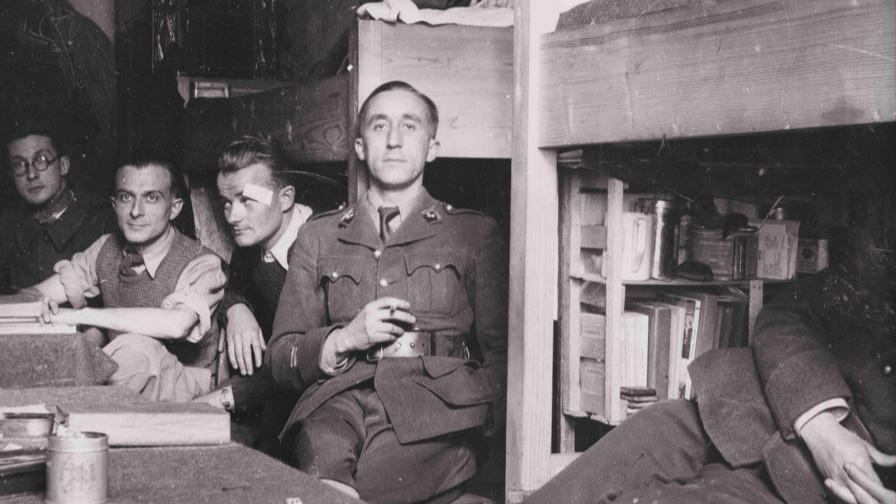Enlarge image
In the open air: In the spring of 1945, around 300,000 Germans were imprisoned in the camps near Remagen and lived for weeks in burrows without a roof over their heads.
At first, food was scarce and people were hungry, but then the supply situation improved.
Photo:
Leone / ullstein picture
On November 13, 2021, around 50 men and a few women marched through the small town of Remagen.
Some held up black flags, others wore funeral wreaths with red flowers.
Three men at the head of the group presented a banner that read: 'Rheinwiesenlager.
A million dead calls for action.«
Well-known right-wing extremists, mainly from Rhineland-Palatinate and North Rhine-Westphalia, ran in the protest march.
The demonstration had been registered by an official of the party "Dierechte" and members of the NPD had also come.
Organizers claimed November was the month of mourning to commemorate the German prisoners of war who perished in Remagen and other camps along the Rhine in 1945.
But her banner made it clear that the grief was just an excuse to spread a conspiracy myth.
It is said that the US Army deliberately allowed a million prisoners of war to die on the Rhine meadows.
This claim is popular among right-wing extremists.
A website disseminates supposed evidence of the number of victims.
In 2020, the head of the Lower Saxony Memorials Foundation reported that guests showed up on guided tours and asked about the Rhine meadows.
They put the Nazi crimes into perspective in just one of the places where they happened.
The message: the Allies were worse than Hitler.
But what really happened in the spring and summer of 1945 on the Rhine meadows?
Why did these prison camps become the subject of a conspiracy myth?
And how does the tale of the "planned death" of the inmates relate to a Canadian novelist?
Continue reading with SPIEGEL+
Read on now.
With the right SPIEGEL subscription.
Special reports, analyzes and background information on topics that move our society - by reporters from all over the world.
Test now.
All articles freely accessible on SPIEGEL.de.
DER SPIEGEL as an e-paper and in the app.
Test one month for €1.
One month for €1
Try it now for €1
Already have a digital subscription?Sign up here
Read more with SPIEGEL+
More perspectives, understand more.
Free access to all articles, videos, audio content and podcasts
All articles freely accessible on SPIEGEL.de
DER SPIEGEL as an e-paper and in the app
DER SPIEGEL to listen to and the weekday podcast SPIEGEL Daily
Only €19.99 per month, cancellable at any time
Buy now
Already have a digital subscription?Sign up here
Restore iTunes subscription
SPIEGEL+ is processed via your iTunes account and paid for with the purchase confirmation.
24 hours before expiry, the subscription is automatically extended by one month at the current price of €19.99.
You can cancel the subscription at any time in your iTunes account settings.
To use SPIEGEL+ outside of this app, you must link the subscription to a SPIEGEL ID account immediately after purchase.
By purchasing you accept our Terms and Conditions and Privacy Policy.






